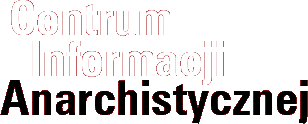You Can't Stop Violence through the Purveyors of Violence
A response to FBI informant Brandon Darby
By now many have heard the story of the activist Brandon Darby who was working for the FBI as an informant from within groups that protested the 2008 Republican National Convention. What makes this story different from dozens of others is that Brandon was not a cop, but an activist turned bad. Furthermore, he has unrepentantly tried to justify his treachery as some sort of "positive work" for peace.
The question of the use of violence in the anarchist movement is by no means a new one. The most common issues of discussion are whether or not certain forms of protest are effective, whether there is a difference between individual acts which include violence as opposed to those which take place in a revolutionary situation, and whether or not violence is justified to stop violence. Besides these questions, for some there might even be a question of what constitutes "violence". It seems that most anarchists would not see acts of direct action which involve property destruction as necessarily falling under the category of "violence", although any such actions might come under scrutiny.
What is not too controversial for anarchists is the role of the state in the purveyance of wide-scale violence. From wars to police brutality, from deadly border policy to the violence of the prison-industrial complex, the state and its institutions bring more violence upon people that perhaps anything else. One of its main functions is to protect the main actors of social injustice from the wrath of the people, to quell opposition and protect the power and privilege of elites. Violence is thus again internalized.
The violence which is born of social injustice is bolstered by years of poverty, exploitation, powerlessness and frustration. This daily violence, which is directed inward and is self-destructive, becomes the public image of violence. It distracts attention from systematic violence and individualizes its very nature.
The state, the institutions and ideologies which are at the roots of mass misery all benefit from the widespread idea that violence is an individual pathology, an antisocial choice. The lines between sociopathic violence and social self-defense are deliberately blurred. Mass entertainment fabulizes the most horrific forms of senseless violence; we become as numb as we are terrified by visions of "the other", the omnipresent threat that not only distracts us and deceives us, but also cause us to give up our liberty and consent to give over "the other" to the torturous punishments of the state.
Once in the possession of the state, in its prisons (privatized or not), only more violence is visited upon the prisoner - both psychological and physical. The prison system sends the abused in for even more abuse, the pretext of remedial justice only a liberal-sounding salve for those few whose conscience extends beyond the most primitive ideals of blood-thirst justice.
These ideas about violence and injustice instill anarchists with a basic sense that in order to peacefully coexist, we must attack all the institutions which threaten peaceful coexistence.
Just how to attack them is a matter of debate. But one thing is clear: the institutions which lie at the base of mass violence have no interest in any solutions which would threaten their existence. It only has interest in tackling those issues which support their self-preservation.
The state is no doubt jumping for joy that it found somebody as self-righteous and ignorant as Brandon Darby, who was willing to turn over two colleagues to them for a round of useless punishment. The uselessness of this act is unlikely to be understood by such a zealot who has convinced himself that he is "doing good". He did not actually prevent any act of violence. The only violence which in fact occurred came from police batons, from his buddies' side. The hypocite Darby could at least be consistent; knowing that police provoke or carry out most acts of real violence during any protest, he should have turned over information on police activity to the non-violent activists who planned to protest the RNC - the ones who really were likely to become the victims of the very violence the self-righteous Darby claims to detest.
Darby in fact did nothing to "stop violence" - he's only telling himself (and the world) that to justify his cop action. He did nothing to stop the violence police committed against unarmed peaceful protestors. He did nothing to stop the violence of the politicians at the convention, who keep stealing our money to drop bombs on children. Just the opposite. His action protected them and sent the opponents of real violence into the instituionalized violence of the prison system.
Luckily Darby knows that most anarchists are really nice people and almost all detest real violence - that is violence against human beings, not storefronts. So he can sleep easily at night knowing that it is not too likely anyone would whack him. Of course had he been a more regular employee of the FBI or CIA and decided to turn over the names of some FBI agents or CIA killers, he probably would not be so lucky. Good thing for him that he decided to work together with state thugs and murderers in the struggle for non-violence.
If Darby actually had any twisted ideas that this might be a "good step" for the anarchist movement (which I sincerely doubt, although he might try to peddle that line to some non-violent activists), he also is wrong. What he did just makes people more paranoid, thus less open to new people. The legal fees is money which the movement could have put to better use. And he helps the fearmongers spread the image of all anarchists as "violent". Maybe there are other characters out there who think that strong condemnation of anarchist bottle-throwers might win them some brownie points among the masses but very few would stoop so low as to take part in such an action of repression and understand, at the very least, that if they really believe in what they preach and want to convince others, that's not the way to do it.
Finally, Darby's self-legitimizing justification shows us the complete uselessness of a "everybody has the right to an opinion' approach when it is not tempered by any analysis or common sense. Darby writes:
"It is very dangerous when a few individuals engage in or act on a belief system in which they feel they know the real truth and that all others are ignorant and therefore have no right to meet and express their political views".
Where is it that a few individuals have real power and take really dangerous actions, if not in the halls of places like the Republican National Convention? And where it is where people have no rights to implement their views if not in a country where the representative democracy ignores the views and in a system where people have no right to decide on actual matters?
Who's really a dangerous individual if not Brandon Darby, who was so sleazy that instead of telling the truth to his colleagues, was so convinced of the correctness of his dogmatic psuedo-pacifist ideology that through covert authoritarian means he acted in concert with the state to curtail the rights of protestors?
This highly moral sounding liberal jibberish means nothing if you are in fact fighting to protect the rights of fascists, zealots, state leaders, warmongers and the like to carry on business as usual without the discomfort of any opposition that might not be satisfied with the empty platitudes which passes as "dialogue" in a system where real power is not allowed to fall into the hands of the people and must be wrenched from those who control the army, the police, the FBI.
The anarchist movement needs to take decisive steps to argue down this ideology, this bastardization of liberal anarchism, which can be twisted to imply that creating defined anarchist approaches or taking direct action against the real enemies of freedom and social justice is akin to espousing totalitarianism.
Solidarity to the activists who must fight against the words and actions of the real enemy of freedom, social justice and the user of state force and violence (B. Darby).






